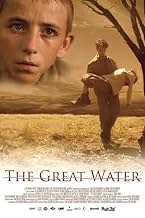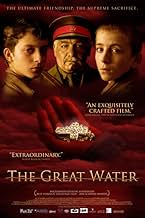IMDb-BEWERTUNG
7,0/10
889
IHRE BEWERTUNG
Füge eine Handlung in deiner Sprache hinzuBased on a children's book written by Zivko Cingo in the 1970s, the movie is about the difficult transition in Macedonia after World War II.Based on a children's book written by Zivko Cingo in the 1970s, the movie is about the difficult transition in Macedonia after World War II.Based on a children's book written by Zivko Cingo in the 1970s, the movie is about the difficult transition in Macedonia after World War II.
- Auszeichnungen
- 4 Gewinne & 1 Nominierung insgesamt
Krume Matov
- 2nd Bodyguard
- (as Krume Matev)
Handlung
WUSSTEST DU SCHON:
- WissenswertesThree main locations: the courtyard, the factory and the lake are actually more than 100 miles from each other. Blending all three locations into one was done by very carefully selected camera angles and set pieces.
Ausgewählte Rezension
Zhivko Chingo wrote a children's book in the 1970s, a Yugoslavian best seller, 'Golemata voda' ('The Great Water') about the way the children of Macedonia responded to the critical changes Communism created in the country in 1945. It is stunningly brought to the screen by Ivo Trajkov as a labor of love and dedication and as an attempt to pay homage to the philosophical sensibilities of the Macedonian people in a difficult time of transition.
The film begins in the present as old Lem (Meto Jovanovski) is experiencing a heart attack and while he is being wheeled into a hospital and examined and wired, he has memory flashbacks to his childhood in 1945 when the WW II was over, Stalin was in power, and orphans were placed in 'orphanages' (re-education facilities) to learn the Communist life. Young Lem (Saso Kekenovski) was brought to the 'orphanage' when his parents were imprisoned for their anti-Stalin stance, and since he is new to the system, he must quickly adjust to the Dickens-like poor house conditions. He is befriended by his 'instructors' Ariton (Mitko Aposolovski) and Olivera (Verica Nedeska), learning how to adjust to the role of obedient brainwashing. The most influential person in Lem's life arrives in the form of young Isak (Maja Stankovska) whose girlfriend has been in the camp prior to Isak's arrival. The manner in which Lem struggles to repay Isak's kindnesses is by acting as a liaison with camp commander to find Isak's love. It is this friendship's course that serves as the tender core of this film.
The struggles quietly underplaying all of the camp surface activity are many: the dichotomy of a Communist ideology removing the Church from existence with a people dependent upon the spiritual values of religion, the Stalin/Tito issue, the adjustments to the policies of Communist regime in a country where fierce national pride had ruled, and the depersonalization of children into political pawns despite the need for role models and the luxury of growing up with friends and confidants. But it is the powerful effect of retrospect as the old Lem relives this tragic time that fills this film with luminous meaning.
This is one of the few films that has been made in Macedonia (a former portion of Yugoslavia now the Republic of Macedonia) and it is a genuinely touching, finely tuned work of art, one that depends on a large cast of non-professional child actors gathered from the Macedonian schools by Ivo Trajkov. The DVD is accompanied by a statement by Trajkov not only about the film but also about the pride of Macedonians that is enlightening and tender. Highly Recommended. Grady Harp
The film begins in the present as old Lem (Meto Jovanovski) is experiencing a heart attack and while he is being wheeled into a hospital and examined and wired, he has memory flashbacks to his childhood in 1945 when the WW II was over, Stalin was in power, and orphans were placed in 'orphanages' (re-education facilities) to learn the Communist life. Young Lem (Saso Kekenovski) was brought to the 'orphanage' when his parents were imprisoned for their anti-Stalin stance, and since he is new to the system, he must quickly adjust to the Dickens-like poor house conditions. He is befriended by his 'instructors' Ariton (Mitko Aposolovski) and Olivera (Verica Nedeska), learning how to adjust to the role of obedient brainwashing. The most influential person in Lem's life arrives in the form of young Isak (Maja Stankovska) whose girlfriend has been in the camp prior to Isak's arrival. The manner in which Lem struggles to repay Isak's kindnesses is by acting as a liaison with camp commander to find Isak's love. It is this friendship's course that serves as the tender core of this film.
The struggles quietly underplaying all of the camp surface activity are many: the dichotomy of a Communist ideology removing the Church from existence with a people dependent upon the spiritual values of religion, the Stalin/Tito issue, the adjustments to the policies of Communist regime in a country where fierce national pride had ruled, and the depersonalization of children into political pawns despite the need for role models and the luxury of growing up with friends and confidants. But it is the powerful effect of retrospect as the old Lem relives this tragic time that fills this film with luminous meaning.
This is one of the few films that has been made in Macedonia (a former portion of Yugoslavia now the Republic of Macedonia) and it is a genuinely touching, finely tuned work of art, one that depends on a large cast of non-professional child actors gathered from the Macedonian schools by Ivo Trajkov. The DVD is accompanied by a statement by Trajkov not only about the film but also about the pride of Macedonians that is enlightening and tender. Highly Recommended. Grady Harp
Top-Auswahl
Melde dich zum Bewerten an und greife auf die Watchlist für personalisierte Empfehlungen zu.
Details
- Erscheinungsdatum
- Herkunftsländer
- Offizielle Standorte
- Sprachen
- Auch bekannt als
- The Great Water
- Drehorte
- Produktionsfirmen
- Weitere beteiligte Unternehmen bei IMDbPro anzeigen
Box Office
- Bruttoertrag in den USA und Kanada
- 17.257 $
- Eröffnungswochenende in den USA und in Kanada
- 6.484 $
- 19. Juni 2005
- Weltweiter Bruttoertrag
- 17.257 $
- Laufzeit1 Stunde 33 Minuten
- Farbe
- Sound-Mix
- Seitenverhältnis
- 2.35 : 1
Zu dieser Seite beitragen
Bearbeitung vorschlagen oder fehlenden Inhalt hinzufügen

Oberste Lücke
By what name was Der Tag, als Stalins Hose verschwand (2004) officially released in India in English?
Antwort



















